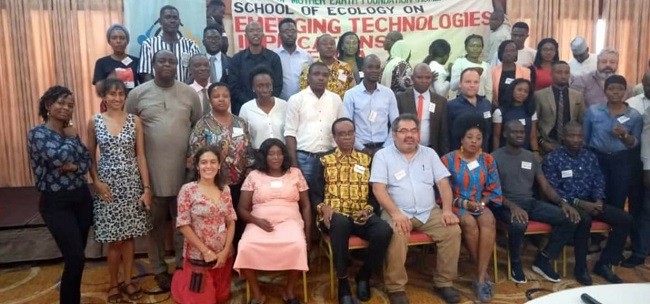Seeking public free, prior and informed consent (FPIC) of indigenous people and local communities must be a precondition for the introduction by African governments of any new technologies in their territories.

This submission formed part of the recommendations arrived at by participants at the School of Ecology that held from October 7 to 8, 2019 in Abuja, Nigeria’s federal capital city.
Such communities, said the delegates from Burkina Faso, Nigeria, Ghana, Kenya, Togo, South Africa, Eswatini, Cote d’Ivoire, Uganda and Cameroon at the conference, must also retain their right to say “No” if they are not in support of such a development.
While underlining the need for the establishment of an African Technology Assessment Platform (AfriTAP) that brings together civil society groups working together to track, understand and assess the implications of emerging technologies, the delegates want African governments to diversify national economies away from dependence on fossil fuels and transit to renewable energy for all – owned and controlled by people.
They are also praying for a moratorium on the approval or deployment of any variant of genetically modified organism, as well as clamourng urgent nation-wide consultations on these and other emerging technologies.
“Governments should shift their focus from industrial agriculture as a solution to the world food and climate crisis, to agroecology, invest in research on agroecology and support small scale farmers with provision of extension service along with infrastructural resources,” the communique, tagged “Abuja Declaration on Emerging Technologies”, said.
Attended by members of civil society, scientists, legal practitioners, faith-based organisations, the School of Ecology, according to officials of Health of Mother Earth Foundation (HOMEF) and ETC Group, the organisers, provided a space to interrogate socio-economic and development concepts, emerging technologies and their implications for Africa.
Parallel to the school, diverse civil society actors in Africa held a meeting which built on previous 12 months of research and interviews on how to create a “technology assessment platform,” relevant to African development needs and aspirations.
Featured were extensive discussions and presentations on a wide range of topics related to emerging technologies, including understanding traditional, modern and post-modern technologies and the implications on agriculture, biodiversity, environment and climate. It further featured presentations on the fourth industrial revolution and the new techno-grab of Africa.
The meetings analysed: different definitions of technology; how the fourth industrial revolution affects conservation and biodiversity; the implications of emerging technologies on agriculture and food, including extreme biotechnology and precision agriculture; the implications of emerging technologies on environment and climate: geo-engineering and extractive technologies; Gene drives, an extreme biotechnology targeted at Africa, with Burkina Faso as the entry point; biosafety policy and legislative frameworks on the continent, especially with reference to Nigeria; and the importance and functions of technology assessment platforms, with examples from Asia and Latin America.
The participants noted:
- That contrary to claims by industry players and their government supporters, technology is not neutral, but rather political and sometimes with conceited objectives.
- Africa has become a dumping ground for new technologies without prior assessments being conducted by governments and civil society groups, and local communities.
- Technologies, such as GMOs, synthetic biology, and geo-engineering, have cultural, sanitary, environmental, economic and social impacts in Africa. They can bring about the disruption of livelihoods on a massive scale.
- Africa is rich in endogenous technologies that can be harnessed to address its socio-economic and ecological challenges. We must not succumb to the warped colonial narrative which insists that Africa is lagging the rest of the world in terms of development.
- While mitigation and adaptation are important, what is most relevant is to address the root causes of climate change such as extractivism and over-consumption imposed by neoliberal capitalism and profiteering. Technologies like gene drives and geoengineering technologies are false solutions to complex problems and merely technofixes.
- Agroecology is a viable alternative to agricultural biotechnology/industrial agriculture and works with nature instead of against it, ensures quality and quantity food production while contributing significantly to the reduction of greenhouse gases in the atmosphere.
